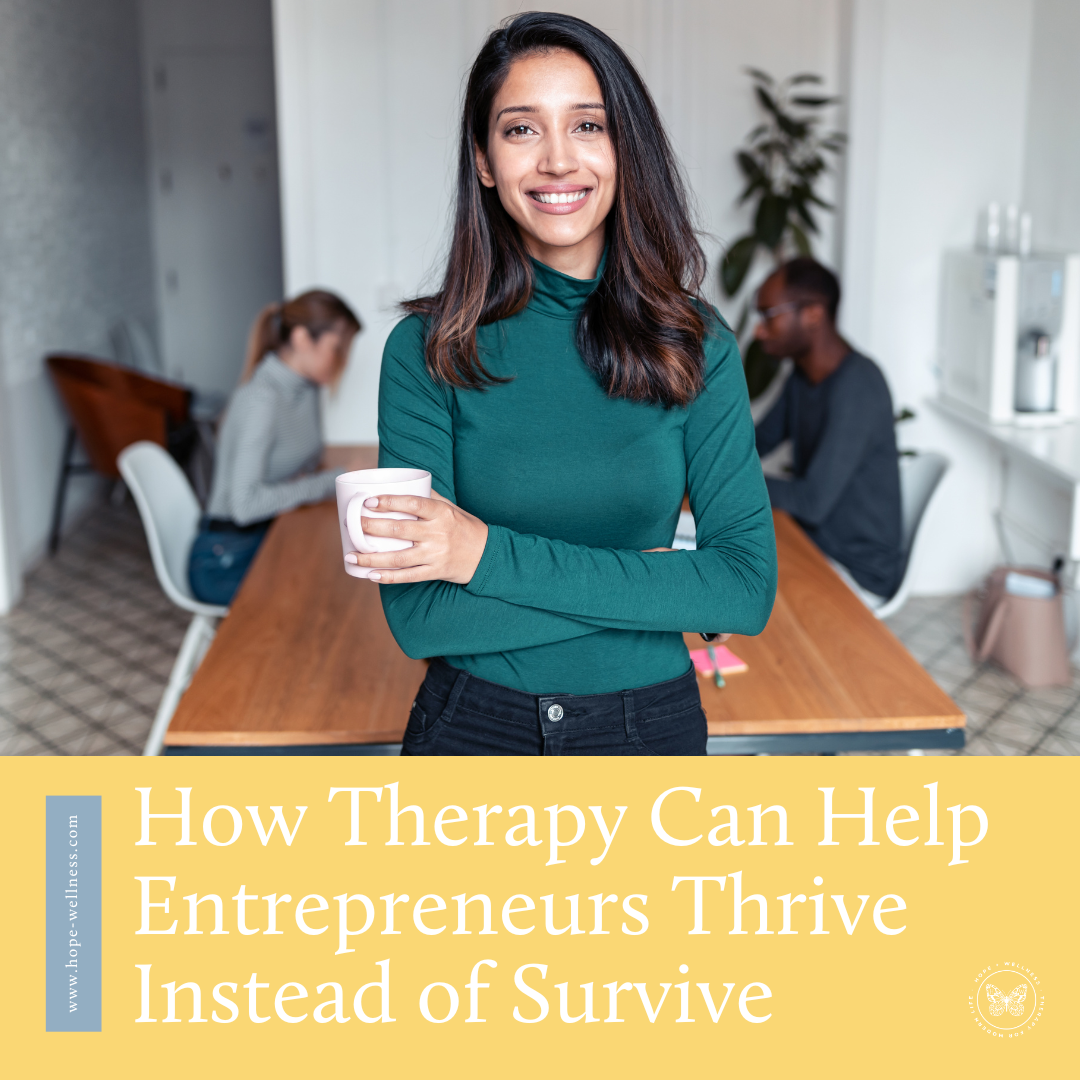
Hope +Wellness Blog
little snippets of advice for everyday challenges many people share

Group Therapy: What Therapists Want You to Know
Like individual therapy, group therapy is a powerful tool for personal growth and healing, and it has many benefits to consider.

I Want to Start Therapy: What Do I Need to Know?
Starting therapy can be overwhelming. How do you know therapy will be helpful? How do you find a therapist that’s right for you? What should you prepare for, in your first session? How much of therapy takes place in therapy, and how much work will you have to do outside of your one on one time? These are common questions, and we want to help you feel informed and prepared.

How Therapy Can Help Entrepreneurs Thrive Instead of Survive
As an entrepreneur, therapy can make a real difference in your business and personal life, while meeting you right where you are. Here’s how.

What You Should Know About Internal Family Systems (IFS) Therapy
Whether you're dealing with anxiety, chronic pain, disordered eating, or relationship challenges, IFS offers a compassionate, non-pathologizing path to self-understanding and healing. Internal Family Systems therapy can be an effective way to heal and transform your internal world. Here’s what you should know about it!

Finding a Psychologist: What to Consider
Are you looking for a psychologist? If you’ve never been through the process before, it feels daunting! How do you go about finding a psychologist? Not just an effective one, but one who truly cares and connects with you? To help, we put together this guide of considerations and steps to take when trying to find a clinical psychologist that’s right for you.

What You Should Know About Exposure and Response Prevention (ERP)
Exposure and Response Prevention (ERP) was developed to treat OCD, and it can be an incredibly effective form of treatment for folks dealing with obsessive thoughts and compulsions.

Cognitive Behavioral Therapy: 5 Things You Should Know About It
CBT is an approach that focuses on how our thinking patterns influence our behavioral patterns. The main idea behind CBT is that thoughts influence how we feel and act. Basically: how we act can in turn also affect how we think and feel in a given situation, and our unhelpful thoughts can then lead to unhealthy behaviors and feelings. CBT helps you to understand and break this cycle.

What You Should Know About EMDR
Are you interested in EMDR? Our clinicians at Hope+Wellness offer EMDR therapy in our office and online.

How Can My Therapist Help with My Chronic Pain?
Suffering from chronic pain, or having a chronic illness with severe physical symptoms might not seem like the kind of thing you can go to a therapist for, but a therapist can be a key element of your chronic pain management.
While your illness or pain may be physically located in your body, that doesn’t mean it’s entirely separate from your mental health. In fact, mental and physical health are incredibly linked. So, when your mental health suffers, your physical health often suffers, and vice versa.

How Can Therapy Help Me Navigate Big Life Changes?
It’s a cliche but it’s true: change is the only constant. So why does it always feel like such an insurmountable task? In therapy, along with navigating crises as they come up and exploring your internal experience, you get the chance to practice skills that make it easier to navigate life transitions when they come up.
Hope+Wellness is a mental health practice specializing in the treatment of depression, mood, stress, and anxiety in kids, teens, and adults. This is a blog about living well and finding meaning and purpose in the face of difficult challenges. This is a blog about finding hope.
Archive
- ACT
- ADHD
- Acceptance
- Anxiety
- Authenticity
- Belonging
- Bipolar
- CBT
- Calming
- Change
- Chronic Illness
- Chronic Pain
- Communication
- Community
- Coping Skills
- DBT
- Dating
- Depression
- EMDR
- Emotions
- Entrepreneurs
- Friendship
- Gratitude
- Grief
- Health Psychology
- Hope
- Inspiration
- Intimacy
- Intuition
- Joy
- Letting Go
- Love
- Manic Depression
- Mindfulness
- Miscarriage
- OCD
- Parenting
- Personal Growth
- Positive Vibes
- Quotes
- Relationships
- Resources
- Self-Compassion
- Self-Reflection
- Services
- Sleep
- Spirituality
- Stress Management
- Stress Relief
- Suffering